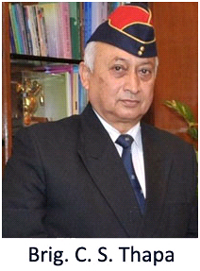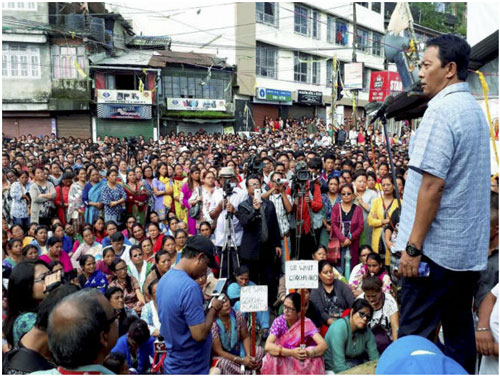
The Gorkha community in India is deeply hurt by the chain of events that have occurred in the last couple of months. Gorkha civil society made umpteen sacrifices and gave all out support for the cause of Gorkhaland. The people of Darjeeling in addition to other forms of deprivations also suffered from food shortages; in addition of other hardships during the 105 days peaceful agitation. The common man feels his sacrifices have gone in vain at the hands of all political classes.
The hurt is even sharper as the Gorkhas feel let down by one of their own taking up the mantle of governance, instead of the much hyped demand of Gorkhaland. There is also a leadership vacuum which has been the bane of the community, thus the community feels silently enraged and let down. It’s easy to write it’s a time to reconcile but how is the question?
The literalmeaning of the word reconcile means “to find a way in which two situations or beliefs are opposed to each other can agree”. Gorkha civil society is divided by various issues but stands united for the cause of Gorkhaland. Thus the path of Gorkhaland and the goal is set, the modalities however differ, and the differentness is being exploited by both, the state and the centre. One of the first issues that civil society needs to address is provide help to those who have suffered from the after effects of the agitation.
These include the kin of the 13 martyrs and helping all those who have been slapped criminal cases and denied justice. Needless to say that there is a foundation and a committee that is looking into this but as a civil society our reflex were not as quick as other civil societies, elsewhere, nationally who have come to the aid of their fellow citizens. Recently after the Koregaon incident fallout lawyers of a community volunteered their services free of cost spontaneously for all those who were arrested.

The people of Darjeeling have suffered and yet New Delhi remains unfazed. There needs to be an understanding that the Gorkha cause as being currently portrayed is not politically expedient, it brings only one MP, whereas, Telangana with 21 MP was politically expedient, thus why should the people of Darjeeling suffer the deprivations. The target must remain the same whereas; the nerve centreneeds to be shifted from Darjeeling to New Delhi and Kolkata.
To do that the focus, and modus operandi, all need to change. If the decision has to be taken at New Delhi and Kolkata, than constitutional and legal means must be applied there. How does the Gorkha cause draw New Delhi attention and greater attention of the Delhi based national press which normally paints this as a case of violence in the hills and break up of Bengal. Gorkha civil society needs to reconcile these differences by trust and dialogue.
The Pashtuns live in Afghanistan and Pakistan but regularly have a system of LoyaJigra in which they assemble and elect a leader, or sort out issues. Hamid Karazi who went on to become the President of Afghanistan was elected on 13 July 2002. The current Gorkha leader as per ground reality is BimalGurung, unfortunately he is in hiding and not available thus the void created by him going underground has been exploited by the state government and a local level leadership created.
Gorkhas need to have a Mahasabha in which the Gorkha civil society needs to select its representative who is acceptable to all including Dooars, who will represent them in the forthcoming parliament elections. The political parties need to move out of this hold as the GJM twice sent BJP candidates to parliament and they never raised their voice on Gorkha identity issue. The same is the case for state level elections. Gorkha civil society has been failed by its political class at both the state and national level thus a need for a proactive approach.
The BJP on whom the GJM trusted let them down not once but twice, thus once bitten twice shy third time never. There have been GorkhaMahasabhas but each has not produced the desired results. In fact Gorkha unity has been a key issue. There are interests between vested interests, which are greater than the collective pain of the community. This has to stop as it makes civil society suffer. There needs to be a meeting ground idealistic it may sound but till such time unity will elude the community, the end state will not be achieved.
The time to select a suitable candidate is now as the community is running out of time for elections ‘19, which may happen early as per some estimates. The selected candidate needs to also tour at least 16 locations, nationally wherever; Gorkhas are in a position to give a united vote resulting in a half percent swing in sixteen affected areas. The fingers of a palm singularly cannot make a dent, join the palm and you have a clenched fist. Gorkhas are spread thin nationally with a lot of people seeking jobs in Bangalore and Mumbai these locations may increase from the current hill locations. Gorkhas have a sizeable population in Meghalaya, Nagaland, and Mizoram and to a lesser extent in Tripura where state elections are due. At the state level Gorkha civil society needs to ensure that the state government supports the cause of Gorkhaland. Only Sikkim has passed a resolution demanding Gorkhaland.
Gorkha civil societies living in Uttarakhand, Himachal Pradesh, and North East states too need to pass this resolution. With a lot of North East states going to the polls this year this can be an election issue that Gorkha civil society can raise.
Another issue that affects the community as it suffers from the same infirmities is reservation. When it comes to merit alone see how well talented youth perform in talent shows. Our children can be found in nearly each and every dance or singing show, where talent matters. But at the competition exams of civil services where reservation are in force they underperform due to lack of reservation. Thus reservation has to be nationally across the board and BhawanChhetri (BC), needs to be included for reasons stated above.
Gorkha civil society is at crossroad and it has suffered financially and Gorkha pride too is hurt. The answer lies in unity and not cynicism which is somehow creeping in and creating a climate of distrust. Cynicism brings an attitude of mistrust, differences aside the community has lots of common bonding thus breaking up into various Samajs is the bane of the community whereas, the infirmities are the same. The Gorkhas need political identity and that can only come with unity, we need to clench your fist and punch above our body weight, politically not literally.
(The writer is an Indian Army veteran who has authored books Gorkha: In Search Of Identity and Gorkha: Society and Politics)